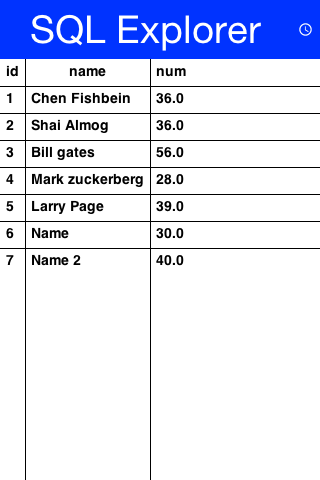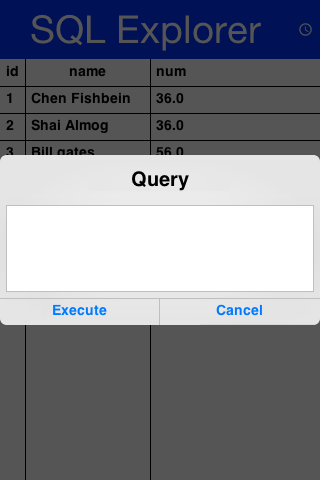
com.codename1.db.Database Maven / Gradle / Ivy
/*
* Copyright (c) 2012, Codename One and/or its affiliates. All rights reserved.
* DO NOT ALTER OR REMOVE COPYRIGHT NOTICES OR THIS FILE HEADER.
* This code is free software; you can redistribute it and/or modify it
* under the terms of the GNU General Public License version 2 only, as
* published by the Free Software Foundation. Codename One designates this
* particular file as subject to the "Classpath" exception as provided
* by Oracle in the LICENSE file that accompanied this code.
*
* This code is distributed in the hope that it will be useful, but WITHOUT
* ANY WARRANTY; without even the implied warranty of MERCHANTABILITY or
* FITNESS FOR A PARTICULAR PURPOSE. See the GNU General Public License
* version 2 for more details (a copy is included in the LICENSE file that
* accompanied this code).
*
* You should have received a copy of the GNU General Public License version
* 2 along with this work; if not, write to the Free Software Foundation,
* Inc., 51 Franklin St, Fifth Floor, Boston, MA 02110-1301 USA.
*
* Please contact Codename One through http://www.codenameone.com/ if you
* need additional information or have any questions.
*/
package com.codename1.db;
import com.codename1.ui.Display;
import java.io.IOException;
/**
* Allows access to SQLite specifically connecting to a database and executing sql queries on the data.
* There is more thorough coverage of the {@link com.codename1.db Database API here}.
*
* The Database class abstracts the underlying SQLite of the device if
* available.
*
* Notice that this might not be supported on all platforms in which case the {@code Database} will be null.
*
* SQLite should be used for very large data handling, for small storage
* refer to {@link com.codename1.io.Storage} which is more portable.
*
* The sample code below presents a Database Explorer tool that allows executing arbitrary SQL and
* viewing the tabular results:
*
*  *
*  *
* @author Chen
*/
public abstract class Database {
/**
* Checks if this platform supports custom database paths. On platforms that
* support this, you can pass a file path to {@link #openOrCreate(java.lang.String) }, {@link #exists(java.lang.String) },
* {@link #delete(java.lang.String) }, and {@link #getDatabasePath(java.lang.String) }.
* @return True on platorms that support custom database paths.
*/
public static boolean isCustomPathSupported() {
return Display.getInstance().isDatabaseCustomPathSupported();
}
private static void validateDatabaseNameArgument(String databaseName) {
if (!isCustomPathSupported()) {
if (databaseName.indexOf("/") != -1 || databaseName.indexOf("\\") != -1) {
throw new IllegalArgumentException("This platform does not support custom database paths. The database name cannot contain file separators.");
}
}
}
/**
* Opens a database or create one if not exists.
*
* @param databaseName the name of the database. Platforms that support custom database
* paths (i.e. {@link #isCustomPathSupported() } return {@literal true}), will also accept a file path here.
* @return Database Object or null if not supported on the platform
*
* @throws IOException if database cannot be created
*/
public static Database openOrCreate(String databaseName) throws IOException{
validateDatabaseNameArgument(databaseName);
return Display.getInstance().openOrCreate(databaseName);
}
/**
* Indicates weather a database exists
*
*
*
* @author Chen
*/
public abstract class Database {
/**
* Checks if this platform supports custom database paths. On platforms that
* support this, you can pass a file path to {@link #openOrCreate(java.lang.String) }, {@link #exists(java.lang.String) },
* {@link #delete(java.lang.String) }, and {@link #getDatabasePath(java.lang.String) }.
* @return True on platorms that support custom database paths.
*/
public static boolean isCustomPathSupported() {
return Display.getInstance().isDatabaseCustomPathSupported();
}
private static void validateDatabaseNameArgument(String databaseName) {
if (!isCustomPathSupported()) {
if (databaseName.indexOf("/") != -1 || databaseName.indexOf("\\") != -1) {
throw new IllegalArgumentException("This platform does not support custom database paths. The database name cannot contain file separators.");
}
}
}
/**
* Opens a database or create one if not exists.
*
* @param databaseName the name of the database. Platforms that support custom database
* paths (i.e. {@link #isCustomPathSupported() } return {@literal true}), will also accept a file path here.
* @return Database Object or null if not supported on the platform
*
* @throws IOException if database cannot be created
*/
public static Database openOrCreate(String databaseName) throws IOException{
validateDatabaseNameArgument(databaseName);
return Display.getInstance().openOrCreate(databaseName);
}
/**
* Indicates weather a database exists
*
* NOTE: Not supported in the Javascript port. Will always return false.
*
* @param databaseName the name of the database. Platforms that support custom database
* paths (i.e. {@link #isCustomPathSupported() } return {@literal true}), will also accept a file path here.
* @return true if database exists
*/
public static boolean exists(String databaseName){
validateDatabaseNameArgument(databaseName);
return Display.getInstance().exists(databaseName);
}
/**
* Deletes database
*
* NOTE: This method is not supported in the Javascript port. Will silently fail.
*
* @param databaseName the name of the database. Platforms that support custom database
* paths (i.e. {@link #isCustomPathSupported() } return {@literal true}), will also accept a file path here.
* @throws IOException if database cannot be deleted
*/
public static void delete(String databaseName) throws IOException{
validateDatabaseNameArgument(databaseName);
Display.getInstance().delete(databaseName);
}
/**
* Returns the file path of the Database if exists and if supported on
* the platform.
*
* @param databaseName The name of the database. Platforms that support custom database
* paths (i.e. {@link #isCustomPathSupported() } return {@literal true}), will also accept a file path here.
* NOTE: This method will return null in the Javascript port.
* @return the file path of the database
*/
public static String getDatabasePath(String databaseName){
validateDatabaseNameArgument(databaseName);
return Display.getInstance().getDatabasePath(databaseName);
}
/**
* Starts a transaction
*
* NOTE: Not supported in Javascript port. This method will do nothing when running in Javascript.
* @throws IOException if database is not opened
*/
public abstract void beginTransaction() throws IOException;
/**
* Commits current transaction
*
* NOTE: Not supported in Javascript port. This method will do nothing when running in Javascript.
*
* @throws IOException if database is not opened or transaction was not started
*/
public abstract void commitTransaction() throws IOException;
/**
* Rolls back current transaction
*
* NOTE: Not supported in Javascript port. This method will do nothing when running in Javascript.
*
* @throws IOException if database is not opened or transaction was not started
*/
public abstract void rollbackTransaction() throws IOException;
/**
* Closes the database
*
* @throws IOException
*/
public abstract void close() throws IOException;
/**
* Execute an update query.
* Used for INSERT, UPDATE, DELETE and similar sql statements.
*
* @param sql the sql to execute
*
* @throws IOException
*/
public abstract void execute(String sql) throws IOException;
/**
* Execute an update query with params.
* Used for INSERT, UPDATE, DELETE and similar sql statements.
* The sql can be constructed with '?' and the params will be binded to the
* query
*
* @param sql the sql to execute
* @param params to bind to the query where the '?' exists
*
* @throws IOException
*/
public abstract void execute(String sql, String [] params) throws IOException;
/**
* Execute an update query with params.
* Used for INSERT, UPDATE, DELETE and similar sql statements.
* The sql can be constructed with '?' and the params will be binded to the
* query
*
* @param sql the sql to execute
* @param params to bind to the query where the '?' exists, supported object
* types are String, byte[], Double, Long and null
*
* @throws IOException
*/
public void execute(String sql, Object... params) throws IOException{
if ( params == null) {
execute(sql);
} else {
//throw new RuntimeException("not implemented");
int len = params.length;
String[] strParams = new String[len];
for ( int i=0; iCheck {@link #supportsWasNull(com.codename1.db.Row) } to see if the platform supports
* wasNull().
*
* Currently wasNull() is supported on UWP, iOS, Android, and JavaSE (Simulator).
* @param row The row to check.
* @return True if the last value accessed was null.
* @throws IOException
* @since 7.0
* @see RowExt#wasNull()
* @see #supportsWasNull(com.codename1.db.Row)
*/
public static boolean wasNull(Row row) throws IOException {
if (row instanceof RowExt) {
return ((RowExt)row).wasNull();
}
return false;
}
/**
* Checks to see if the given row supports {@link #wasNull(com.codename1.db.Row) }.
* @param row The row to check.
* @return True if the row supports wasNull().
* @throws IOException
* @since 7.0
* @see #wasNull(com.codename1.db.Row)
* @see RowExt#wasNull()
*
*/
public static boolean supportsWasNull(Row row) throws IOException {
return row instanceof RowExt;
}
}